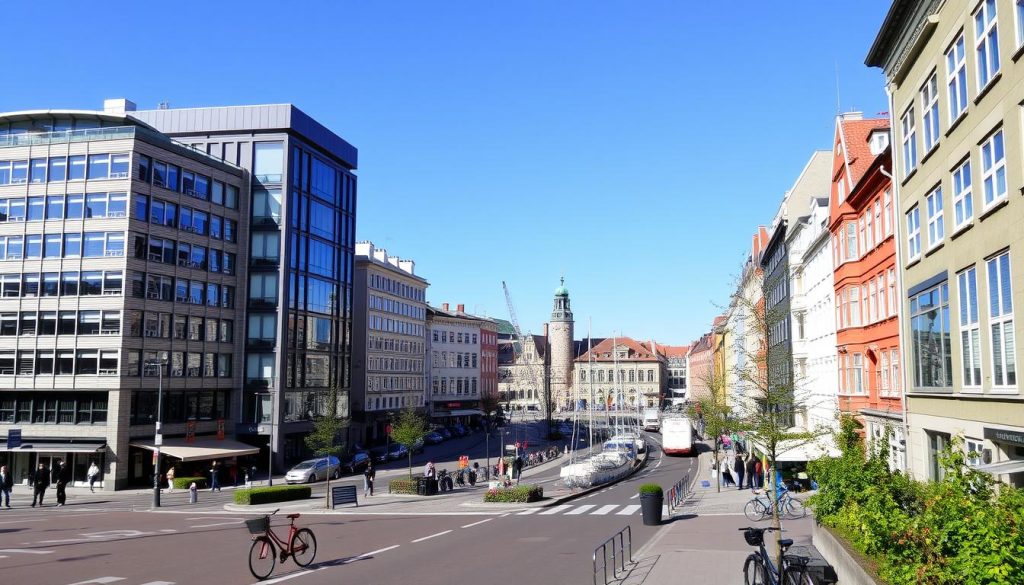For entrepreneurs and businesses seeking new horizons, relocating to Denmark for business presents a compelling opportunity. Denmark’s robust economy and favourable business climate make it an attractive destination for UK companies. The country is renowned for its transparency, innovative companies, and skilled workforce, making the prospect of establishing a presence there increasingly appealing.
As interest in business opportunities in Denmark continues to grow among expatriates and entrepreneurs, understanding the market dynamics and the supportive regulatory environment becomes paramount. This section will delve into why Denmark stands out as a premier location for business ventures, offering insights into its advantages and potential for growth.
Introduction to Business Opportunities in Denmark
Denmark emerges as a dynamic hub for entrepreneurs, boasting a landscape rich in innovation and sustainability. The nation’s dedication to these principles significantly amplifies its market potential. Industries such as technology, renewable energy, pharmaceuticals, and design are experiencing exponential growth, drawing both local and international investors.
Government initiatives are pivotal in nurturing entrepreneurship. These programmes offer financial support, mentorship, and access to resources, benefiting both startups and established entities. Consequently, Denmark has solidified its reputation as a beacon for innovation. The availability of advanced research and development facilities further enhances the entrepreneurial environment.

Statistical data underscores Denmark’s substantial market potential. The country consistently ranks among the top in global competitiveness and ease of doing business indices. Moreover, its highly skilled workforce significantly contributes to various sectors, ensuring that businesses have the necessary talent to flourish.
Foreign businesses considering a presence in Denmark will find an array of support systems. The country offers extensive networking opportunities, incubators, and co-working spaces, creating a robust framework for success. Entrepreneurs are greeted with an environment that encourages creativity and collaboration, positioning Denmark as an ideal location for business launch and growth.
Understanding Denmark Business Visa Requirements
The process of relocating to Denmark for business necessitates a comprehensive understanding of the diverse requirements for business visas. Various visa options are available, each tailored to specific needs, such as the General Work Visa, Start-up Visa, and the Pay Limit Scheme. This section elucidates these options and provides a detailed overview of the application process, aiming to streamline your journey towards establishing a presence in Denmark.
Types of Business Visas Available
Several business visa options are available for those aspiring to work or start a business in Denmark. The most notable include:
- General Work Visa: Ideal for individuals with a job offer from a Danish employer.
- Start-up Visa: Specifically designed for entrepreneurs aiming to establish a new business in Denmark.
- Pay Limit Scheme: Applicable to high-skilled workers whose salary exceeds a specific threshold.
It is imperative to comprehend the eligibility criteria for these options. For example, entrepreneurs applying for a Start-up Visa must showcase innovative business ideas with the potential for growth within the Danish market.
Application Process Overview
The application process for a business visa may seem complex but is navigable with proper guidance. The following steps are essential for securing a business visa:
- Collect all necessary documentation, including a detailed business plan and financial statements.
- Complete the relevant application forms for your chosen visa type.
- Provide proof of funding to ensure the financial viability of your business venture.
- Keep abreast of processing times, which can fluctuate based on visa type and individual circumstances.
Thorough preparation can mitigate potential challenges and ensure a more efficient experience while navigating the Denmark business visa requirements.
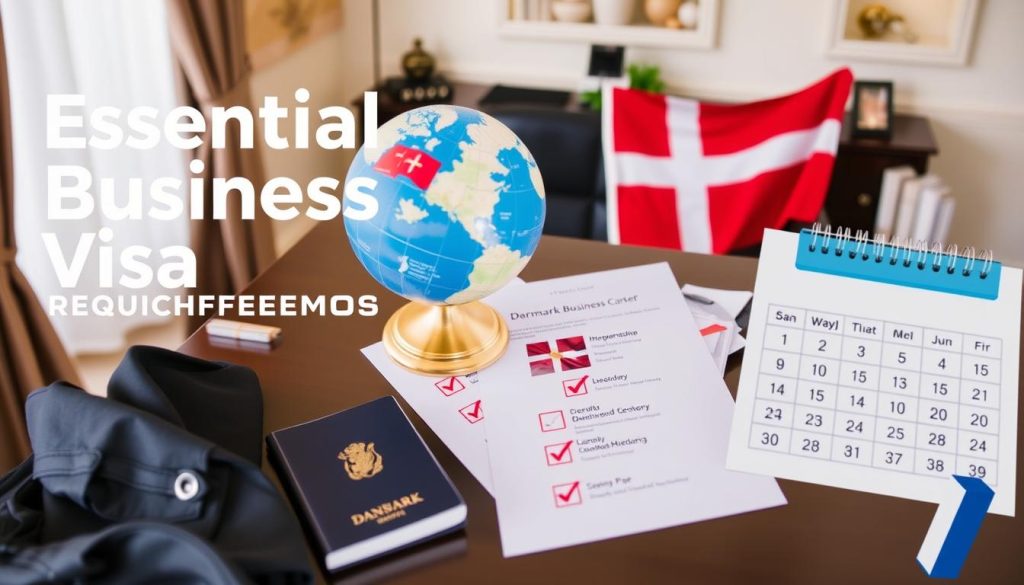
Denmark Corporate Tax Rates and Regulations
Denmark’s corporate tax framework is highly competitive, positioning it as a prime location for businesses. Grasping the nuances of Denmark’s corporate tax rates and regulatory framework is imperative for any foreign entity or entrepreneur contemplating operations within this Nordic nation.
Current Tax Rates for Businesses
The corporate tax rate in Denmark is uniformly set at 22%, mirroring several EU counterparts. This flat rate fosters a stable taxation environment, advantageous for companies. Furthermore, entities must consider additional tax liabilities, such as Value Added Tax (VAT) and employee taxation. Mastery of these taxation modalities in Denmark is vital for sound financial strategy formulation.
Key Regulations Affecting Corporations
Corporations must also comprehend the regulatory framework to ensure adherence. Key regulatory areas include labour laws, environmental safeguards, and corporate governance standards. Entities aspiring to excel in this market must comply with reporting mandates and regulatory stipulations issued by Danish authorities. Vigilance regarding these regulations is essential to avoid potential pitfalls and establish a solid foundation for operational success.

Relocating to Denmark for Business: Key Considerations
Expats contemplating relocation to Denmark for business must consider several pivotal factors that could profoundly influence their experience. The cultural nuances inherent in the Danish work environment are of paramount importance. Grasping local customs and social norms is crucial for a seamless transition and the cultivation of effective working relationships.
Language proficiency is another critical element for prospective relocators. Although English is commonly spoken, particularly in professional settings, acquiring basic Danish phrases can be beneficial. It showcases respect for the local culture and aids in more effective communication with colleagues and clients.
The financial aspects of conducting business in Denmark may vary significantly from what expats are familiar with in their home countries. It is imperative to conduct exhaustive research on the local market, operational expenses, and tax obligations. These considerations are fundamental for expats aiming to establish or expand their enterprises in Denmark.
- Cultural understanding and adaptation
- Language skills and local communication
- Operational and market costs in Denmark
Proper preparation and the acquisition of local insights can significantly ease the process of relocating to Denmark for business. The knowledge gained from this preparation can pave the way for a fulfilling professional journey in this dynamic and innovative nation.

Insights into Denmark Business Culture
The nuances of Denmark’s business culture are imperative for those contemplating a professional relocation. The culture’s hallmark is its profound emphasis on achieving a harmonious work-life balance. This philosophy fosters an environment where personal and professional development can thrive simultaneously, thereby augmenting business productivity.
Importance of Work-Life Balance
In Denmark, the notion of work-life balance extends beyond mere policy, deeply ingraining itself in daily organisational practices. Employees are incentivised to harmonise their professional aspirations with their personal lives, facilitated by flexible working hours and remote work options. This cultural evolution not only boosts employee contentment but also diminishes burnout, resulting in a more energised workforce. Entities that appreciate the significance of preserving this equilibrium typically experience enhanced staff loyalty and reduced turnover.
Collaboration and Teamwork in Danish Companies
At the core of Danish corporate culture lies a robust emphasis on teamwork and collaboration. This collaborative ethos nurtures innovation and creativity, enabling businesses to adapt effectively in ever-changing markets. Team members perceive one another as peers, promoting open communication and the exchange of ideas. Such an atmosphere not only stimulates problem-solving but also cultivates a sense of community within the workplace, thereby strengthening team cohesion and collective achievement.

Navigating Denmark Business Etiquette
Grasping the nuances of Denmark’s business etiquette is imperative for those aspiring to carve out a distinguished niche in the local business sphere. The intricacies of greetings, dress codes, and the expected behavioural norms within Danish professional environments are paramount for expatriates. Such knowledge is instrumental in fostering a successful and harmonious professional presence.
Common Practices and Expectations
In Denmark, punctuality is not merely a virtue but a cornerstone of respect for others’ time. Arriving precisely on schedule for engagements signifies a profound regard for the value of time. The dress code, while leaning towards smart casual, underscores the importance of maintaining a professional appearance. The handshake, firm and accompanied by unwavering eye contact, epitomises the directness that is a hallmark of Danish business interactions.
- Be punctual for meetings and appointments.
- Dress in smart casual attire, avoiding overly formal clothing.
- Use a firm handshake when greeting individuals.
- Maintain eye contact to show confidence and honesty.
Understanding Communication Styles
The communication style prevalent in Denmark is distinguished by its directness and clarity. Honesty is highly valued, thus it is advisable to articulate thoughts and ideas with unambiguous candour. In negotiations, the presentation of ideas should be accompanied by factual evidence, aligning with the preferred Danish communication style. An openness to feedback and an engagement in dialogue are crucial for nurturing robust business relationships.
- Be clear and concise in your communication.
- Encourage open discussions to foster collaboration.
- Welcome constructive criticism as a means of improvement.
- Focus on factual information during negotiations.

Cost of Living for Expats in Denmark
Relocating to Denmark necessitates a thorough understanding of the cost of living, a critical factor for effective budgeting. Housing expenses for expatriates exhibit considerable variability, particularly in urban hubs such as Copenhagen, Aarhus, and Odense. The influence of location, size, and amenities on accommodation choices cannot be overstated.
Housing and Accommodation Expenses
The rental market in Denmark is characterised by elevated prices, especially in the capital. Anticipate monthly expenditures ranging from DKK 12,000 to DKK 15,000 for a satisfactory one-bedroom apartment in Copenhagen. For newcomers, exploring neighbourhoods beyond the city centre can unveil more economical options. Considerations include:
- Shared accommodations
- Studios
- One- and two-bedroom apartments
Expats should also factor in supplementary costs, such as heating and electricity, which can elevate monthly housing expenses by an average of DKK 1,200.
Daily Living Costs: Food, Transport, and Leisure
Expenses beyond housing in Denmark are substantial. A single individual might allocate DKK 3,500 to DKK 4,500 monthly for groceries. Dining out is expensive, with meals at mid-range restaurants exceeding DKK 150. Transportation costs, including a monthly public transport pass, amount to approximately DKK 750.
Leisure activities, such as cinema tickets, gym memberships, and other forms of entertainment, also contribute to the overall budget. A comprehensive understanding of these expenses is essential for establishing a viable financial plan.

Copenhagen Office Space Rental Options
In the vibrant city of Copenhagen, a plethora of office space rental options awaits, each designed to meet the distinct needs of businesses. From startups to established enterprises, the variety of available spaces ensures that every company can find a suitable environment to thrive. It is imperative for businesses to comprehend the nuances of these options to make an informed decision, thereby optimising their operational efficiency and growth potential.
Types of Office Spaces Available
- Co-working Spaces: Perfect for startups and freelancers, these environments foster collaboration and offer flexible leasing arrangements, ideal for those with evolving business needs.
- Traditional Offices: For those preferring a more structured approach, traditional offices provide a stable, long-term presence with comprehensive facilities.
- Serviced Offices: Offering a fully equipped solution, serviced offices include essential services such as reception and maintenance, allowing businesses to focus on their core activities without the administrative burden.
Factors Influencing Rental Prices
The rental prices for office spaces in Copenhagen are influenced by a multitude of factors. The location of the office is a critical determinant, with central areas commanding premium rates due to their accessibility and prestige. Additionally, the range of amenities provided, such as high-speed internet and state-of-the-art meeting facilities, can substantially impact the overall cost. The current economic climate also plays a pivotal role, as businesses adapt their strategies to navigate the ever-changing market demands.

Finding Local Partners and Networking Opportunities
Entering the Danish market necessitates a profound understanding of regulatory frameworks and market dynamics. However, the essence of establishing a foothold lies in the realm of networking. For expatriates, forging connections with local entities is paramount. Such interactions can catalyse the formation of alliances that significantly bolster your business’s prospects.
Attending local gatherings is a pivotal strategy for embedding oneself within the Danish commercial sphere. Conferences, trade fairs, and industry-specific meet-ups offer unparalleled avenues for networking. The Danish Chamber of Commerce, for instance, hosts events that draw a diverse array of business sectors, providing fertile ground for potential partnerships.
Membership in business associations can also prove advantageous. These entities frequently facilitate networking, mentorship, and access to resources, all of which are instrumental in navigating the entrepreneurial landscape. Engaging with these groups affords the opportunity to align with professionals who share your interest in forging local business alliances.
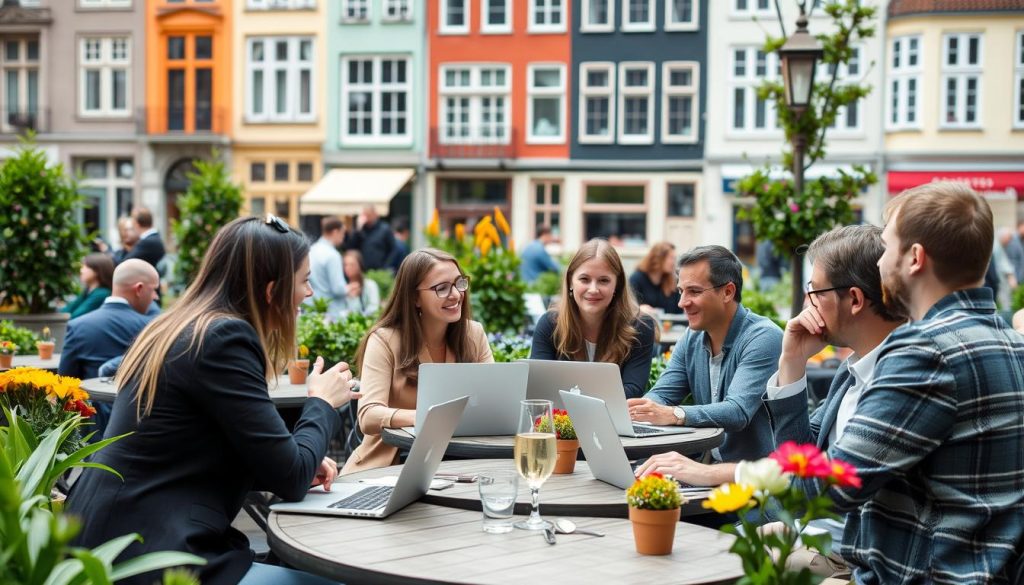
Levelling up your networking game through LinkedIn is another astute move. This platform emerges as a formidable tool for networking within Denmark. By forging connections with local professionals and engaging in sector-specific discussions, you can cultivate a robust online presence. This, in turn, enhances your likelihood of forging partnerships of substance.
The advantages of cultivating ties with Danish enterprises are manifold. Such alliances can catalyse collaborative ventures, facilitate knowledge exchange, and grant access to novel markets. These factors collectively amplify your operational prowess within Denmark.
Setting Up a Business Bank Account in Denmark
The establishment of a business bank account in Denmark is paramount for entrepreneurs seeking to navigate the Danish market effectively. The array of banking options necessitates a meticulous selection process to ensure seamless transactions and enhanced financial oversight.
Choosing the Right Bank
In the selection of a bank for your business account, several factors merit consideration:
- Services Offered: Opt for banks that provide bespoke services for businesses, encompassing merchant accounts and lending facilities.
- Fees: Diverse fee structures exist among banks. It is imperative to compare these to identify the most economical option.
- Online Banking Capabilities: Given the contemporary digital landscape, ensure the bank’s online banking platform is intuitive and efficient for financial management.
- Customer Service: The quality and availability of customer support are critical in addressing potential challenges.
Documents Required for Account Opening
To initiate the process of opening a business bank account in Denmark, specific documentation is required. The following enumeration details the essential documents for a streamlined setup:
- Valid Identification: Your passport or national ID card.
- Proof of Business Registration: An official certificate confirming the establishment of your business.
- Financial Information: Details of your business’s financial standing, including revenue projections and current financial statements.
- Tax Information: Your business’s tax identification number or VAT registration.
- Partnership Agreements: If relevant, documents detailing the structure of your business partnerships.
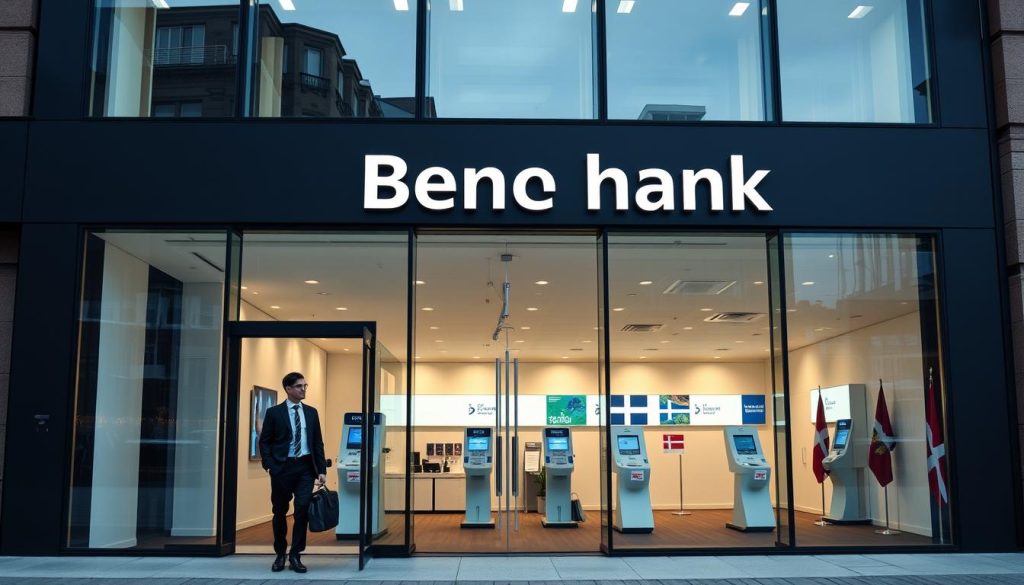
Understanding the Danish Labour Market
Denmark’s labour market is distinguished by its blend of robust employee protection and economic flexibility. This unique framework enables both employers and employees to perform their roles with efficiency. The workforce in Denmark is endowed with comprehensive rights and benefits, supported by a robust legal framework.
Labour laws in Denmark mandate fair working conditions, prohibit discrimination, and uphold the right to unionise. Employees are granted extensive parental leave, a comprehensive social safety net, and access to healthcare, enhancing their well-being and productivity.
The Danish workforce is characterised by its high educational standards and skill levels, a result of a structured education system focused on labour market relevance. This talent pool is rich in innovation and creativity, making Denmark an appealing location for businesses seeking to expand.
Grasping the nuances of Denmark’s labour market is essential for those contemplating a business move to the country. Knowledge of employee rights and the economic landscape can profoundly influence recruitment and retention strategies in this dynamic setting.

Fully Embracing the Local Lifestyle
For a genuine appreciation of the expat lifestyle in Denmark, assimilation into Danish society is paramount. Embracing the local culture not only augments personal experiences but also fosters a sense of belonging. The acquisition of the Danish language, participation in community events, and comprehension of local customs are pivotal in the integration process. Engaging with neighbours, joining clubs or groups, and attending festivals offer prime opportunities for connection.
Integration into Danish Society
The role of language in integration cannot be overstated. Although the Danish language may initially seem daunting, a plethora of resources are available for expatriates to learn. Local communities frequently provide language classes specifically designed for newcomers. Furthermore, active participation in everyday situations significantly enhances language proficiency. The assistance of kind neighbours or local acquaintances in practising speaking is invaluable.
“Embracing the local culture gives you a richer experience living here.”
Key Cities Apart from Copenhagen
Copenhagen, Denmark’s vibrant capital, is renowned for its dynamism. However, other cities offer distinct opportunities for those exploring Denmark. Aarhus, dubbed the unofficial capital of Jutland, boasts a vibrant cultural scene and a thriving business environment. Odense, celebrated for its rich history and lively atmosphere, provides ample options for leisure and business. Aalborg, with its blend of modernity and tradition, is ideal for those seeking a balance between urban living and community spirit.

Each of these cities significantly enriches the expat lifestyle in Denmark. By venturing beyond Copenhagen, expatriates can uncover a diverse array of experiences tailored to their preferences and professional interests.
Exploring the Benefits of Relocating to Denmark for Business
Relocating to Denmark presents a plethora of advantages for expatriates aiming to enhance their professional trajectories and entrepreneurial ventures. The country’s workforce stands out due to its high educational standards. This ensures that employees are equipped with the requisite competencies to excel in a rapidly evolving professional landscape.
The economic stability of Denmark is another crucial benefit. Characterised by low unemployment rates and a thriving industrial sector, the environment fosters entrepreneurial ambitions. Expatriates can delve into sectors such as technology, renewable energy, and pharmaceuticals, benefiting from a supportive regulatory environment.

The quality of life in Denmark is also noteworthy. The country’s comprehensive social welfare system provides access to healthcare, education, and social services, enhancing overall well-being. Expatriates can leverage this high standard of living to boost both personal contentment and professional efficacy.
- Access to a highly skilled workforce
- Stable economic environment conducive to business growth
- Comprehensive social welfare benefits for residents
- Focus on innovation and sustainability across industries
These elements collectively underscore the unique advantages of relocating to Denmark. Expatriates can thrive in a supportive, high-quality setting that promotes both personal and professional advancement.
Challenges to Consider When Relocating
Embarking on a business relocation to Denmark introduces a plethora of challenges for expatriates. Cultural adaptation emerges as a paramount obstacle, given the stark contrast between the Danish egalitarian ethos and the norms of many expatriates. Mastery of local customs and values is imperative for a seamless transition.
The labyrinthine nature of Danish bureaucracy poses another formidable challenge. The intricacies of paperwork, permits, and regulatory frameworks can overwhelm even the most diligent expatriates. Proactive engagement with local consultants or legal advisors is crucial to streamline this process.
The elevated cost of living in urban hubs, such as Copenhagen, further complicates the relocation experience. Housing, utilities, and everyday expenses can escalate rapidly, necessitating meticulous financial planning. A thorough examination of living costs and exploration of diverse neighbourhoods are essential to secure affordable accommodation.
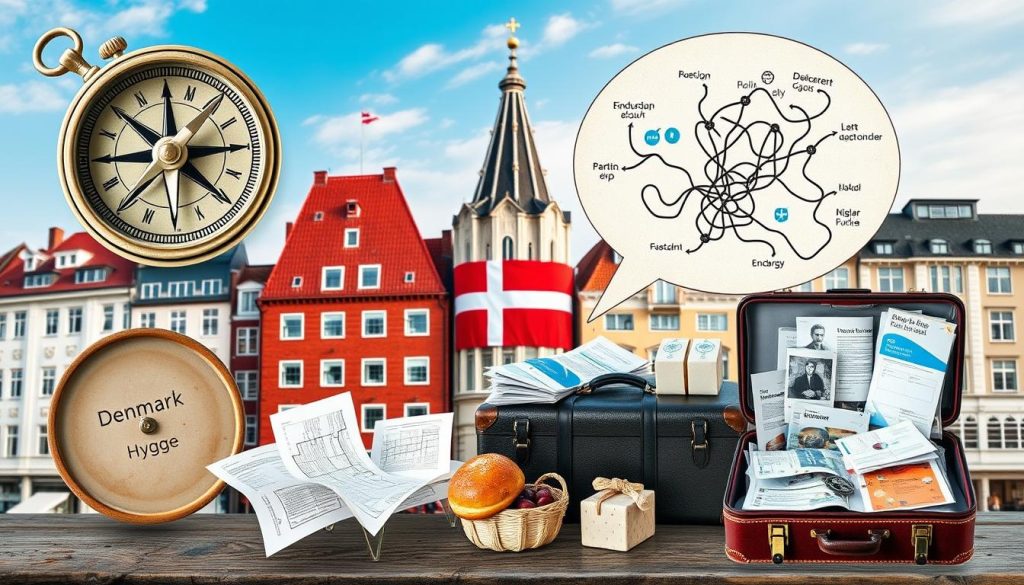
Expatriates can mitigate these challenges by adopting practical strategies. Participation in local expat groups, attendance at networking events, and seeking counsel from fellow business professionals are invaluable. Establishing a robust expat community provides access to indispensable insights and resources, facilitating a smoother transition.
Resources and Support for Expats in Denmark
The transition to a new country, such as Denmark, presents both challenges and opportunities. A plethora of resources and support mechanisms are available to assist expatriates. Engaging with local expat groups is highly recommended, as these communities offer invaluable opportunities for sharing experiences, networking, and forging friendships. Such groups provide insights into the nuances of Danish life, facilitating a smoother integration for newcomers.
The Danish government’s role in supporting expats cannot be overstated. It provides comprehensive online platforms for accessing critical information on residency, work permits, and societal integration. These resources are particularly beneficial for those requiring legal assistance or guidance. Additionally, local authorities frequently organise events aimed at fostering interaction between Danish citizens and expatriates, promoting a sense of community and belonging.
Staying abreast of local developments is crucial for navigating life in Denmark effectively. Expatriate resources in Denmark include newsletters and social media groups that disseminate information on cultural events, social gatherings, and significant announcements. With the appropriate support networks in place, expatriates can feel more at home and fully appreciate the myriad offerings of Denmark.

